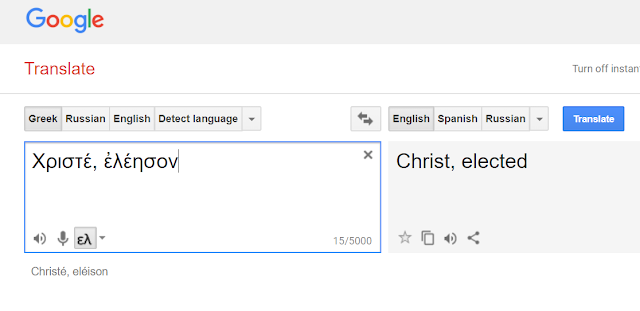Sermon for Lent 1B, preached on Sunday, February 18, 2018, by the Rev. Daniel M. Ulrich.
 “And lead us not
into temptation…” We pray this every
day in the Lord’s Prayer. With faith, we
come before our Father in heaven and ask Him not to do something that He
already doesn’t do. Luther explains this
petition by first saying, “God tempts no one.”
If God tempts no one, then why do we pray this? … Because we need Him to
guard us from temptation, to keep us from the devil, the world, and our sinful
nature. We need Him to deliver us from
evil through Christ Jesus who resisted all temptation.
“And lead us not
into temptation…” We pray this every
day in the Lord’s Prayer. With faith, we
come before our Father in heaven and ask Him not to do something that He
already doesn’t do. Luther explains this
petition by first saying, “God tempts no one.”
If God tempts no one, then why do we pray this? … Because we need Him to
guard us from temptation, to keep us from the devil, the world, and our sinful
nature. We need Him to deliver us from
evil through Christ Jesus who resisted all temptation.
When Luther explained the 6th petition by saying “God
tempts no one,” he wasn’t making it up.
This is exactly what God says, “Let
no one say when he is being tempted, ‘I am being tempted by God;’ for God
cannot be tempted with evil, and he himself tempts no one” (Jas 1:13). God can’t tempt us because temptation is
evil, it leads to sin. If God tempted us
then He would be the cause of sin; He’d be evil. But this can’t be because God is pure, holy,
and righteous.
Scripture is clear, God tempts no one...but Scripture
is also clear saying God tests His saints.
We see this in the Old Testament reading, the Binding of Isaac. In the very first verse we hear “After these things God tested Abraham” (Gn
22:1). God tested Abraham by
commanding him to take his only son Isaac and sacrifice him as a burnt
offering.
Often temptation and testing appear to be the same
thing. They may even feel the same...but
they’re not. Temptation and testing come
from two totally different places, for two totally different purposes.
Temptation comes from within each and every one of
us. It comes from our sinful nature,
from our perverse and turned inward desires.
Temptation comes from the world around us that tells us to pursue these
desires, that they’re okay. Everyone
else is doing it, why can’t we? In order
to enjoy this short life, to live it to the full, we need to be true to these
desires. Temptation comes from Satan who
delights in us putting ourselves first.
He lies to us through any means he can, convincing us that our selfish
desires are good and that God really wants us to fulfill them in order to be
happy. This is the very thing he did
with our first parents in the Garden, and it’s the very thing he does with us
today.
Even though Satan, the world, and our sinful nature
try to convince us that temptation is good, that giving in will make us happy
and give us life, it won’t. We always
think if I just give in to these feelings or those feelings, if I satisfy that
sexual desire, if I let loose and scream obscenities at that person, if I just
give into you name whatever temptation you want to name, then everything will
be alright. But it doesn’t work like
that. Temptation doesn’t lead to good
and life, it only leads to death. “Each person is tempted when he is lured
and enticed by his own desire. Then
desire when it has conceived gives birth to sin, and sin when it is fully grown
brings forth death” (Jas 1:14-15). This
is the purpose of temptation, to lure you away from God into death.
But that’s not the purpose of testing. Testings leads us to God, it strengthens our
faith in Christ.
Earlier in James’ letter he writes, “Count it all joy, my brothers, when you
meet trials of various kinds, for you know that the testing of your faith
produces steadfastness. And let
steadfastness have its full effect, that you may be perfect and complete,
lacking in nothing” (Jas 1:2-4). St.
Paul encourages us similarly in Romans. “Not only that, but we rejoice in our
sufferings, knowing that suffering produces endurance, and endurance produces
character, and character produces hope, and hope does not put us to shame,
because God’s love has been poured into our hearts through the Holy Spirit who
has been given to us” (Rom 5:3).
Although it may be difficult
and even seem downright impossible at times to rejoice in our sufferings, with
faith we can take joy in them because we know that God is using them to
strengthen our faith. Testing isn’t for
our harm but our benefit. Like an
athlete who undergoes the trials and testing of training to strengthen his
muscles, our faith is strengthened through testing for the purpose of holding
on to Christ and receiving the crown of life.
God tests His saints actively and passively. Actively, He puts trials before them, like
Abraham. The command to sacrifice his
son was certainly a difficult test of Abraham’s faith. But trusting in the Lord’s promises, Abraham
endured and through this test his faith was strengthened. After the binding of Isaac, Abraham’s trust
in God was stronger, knowing God would always keep all His promises.
Passively, God tests His saints by allowing trials to
befall them. Think of Paul, who endured
all sorts of tribulations: beatings; imprisonments; hunger; even
shipwrecks. Scripture doesn’t say God
caused these and yet He used these tests to strengthen Paul’s faith.
These are
the most common tests that we endure. We
endure all sorts of tests and trials in life.
Health issues, financial hardships, strife in relationships. We’re not promised an easy life just because
we’re Christians. We suffer many
things. We suffer the consequences of
sin left and right. When we encounter
these types of tests, with eyes of faith we see them for what they are. We recognize our sin, we repent of it, and we
look toward God trusting He’ll bring us through them all the while making our
faith stronger.
Testing
and temptation aren’t the same.
Temptation is from our sinful flesh, from the world, and Satan for the
evil purpose of leading us away from God.
Testing is from God for the purpose of leading us to Him. Two totally different things, but the answer
to enduring both is the same...Jesus Christ.
The answer to enduring temptation is Christ who
overcome all temptation and sin. The
author of Hebrews says Christ was tempted in every way that we are, and yet He
did not sin (Heb 4:15). This temptation
happened all of Jesus’ life: as a boy, as a teen, and as a man. He faced the devil one on one in the
wilderness, resisting his temptations.
On the cross, He resisted the temptations to come down and save
Himself. Every day Jesus had to overcome
temptations that tried to lead Him away from God’s will and plan of
salvation. And thanks be to God that He
overcame every single one.
If Christ gave in to any one of these temptations,
then there’d be no hope for us, we’d be enslaved to sin forever. Jesus’ sacrifice would’ve been useless for
us. Only the death of a sinless Savior
could save us. Jesus is that sinless
Savior. He faced the devil and resisted
all temptations for you. He died for
you, for the forgiveness of your sin.
Through His blood temptation, sin, and Satan have been overcome. No longer are you enslaved to it. Clothed in Christ’s righteousness you strive
to resist temptation. You endure with
faith knowing Jesus has overcome, knowing you’ve been forgiven!
Christ our Savior is also the answer to enduring all
tests from God, for He is the fulfillment of all God’s promises. Abraham was able to endure the binding of
Isaac because he trusted God would fulfill His promise to make Abraham a great
nation and bless all people through Isaac.
Abraham believed that God would raise his son from the dead (Heb
11:19). This is how Abraham could’ve
gotten all the way up the mountain, he knew God was faithful. And we know this too, for God has fulfilled
all His promises in Jesus.
When our first parents gave into temptation, God
promised to send us a Savior. Jesus is
that Savior, dying on the cross and rising again, crushing Satan’s head and
overcoming sin and death for us. God is
faithful in His promises. He kept His
promise to save us and He’ll keep His promise to keep us. Knowing this, with faith, we know we can
endure all testing, because we are God’s, redeemed in Christ, saved in
Christ.
We pray “lead us
not into temptation,” knowing God tempts no one. We pray this with faith in God’s promises to
deliver us from all evil. We pray this
with faith in our Savior who resisted all temptation for us, who died for us
for the forgiveness of our sin. With
eyes looking to Jesus, we endure temptation knowing it’s been defeated in Him,
and we endure testing knowing it’s for our good, for the strengthening of our
faith, that we might receive the crown of life in Him. In Jesus’ name...Amen.









